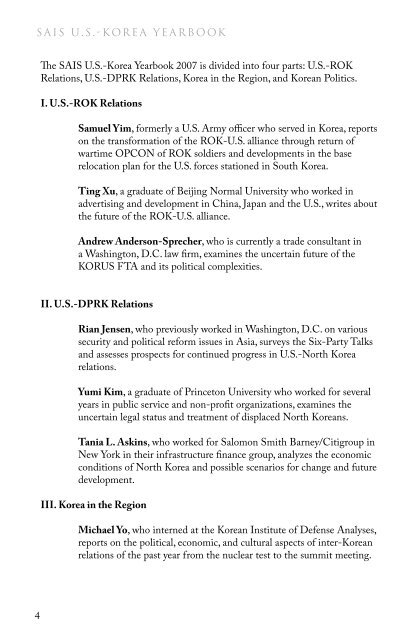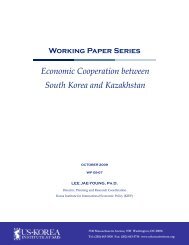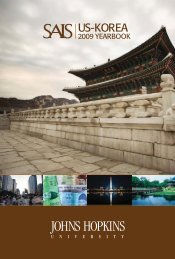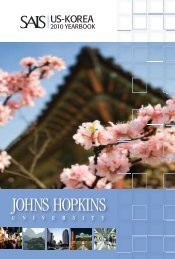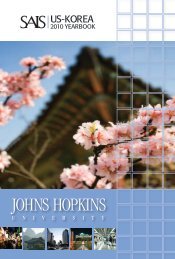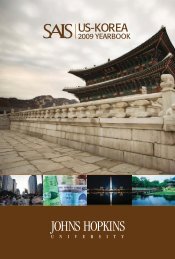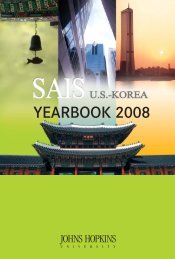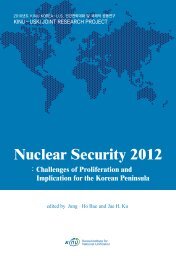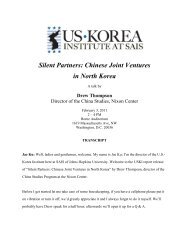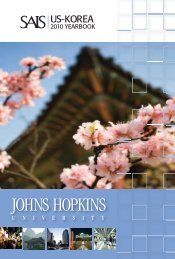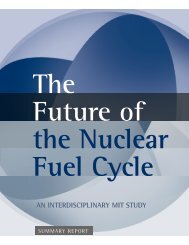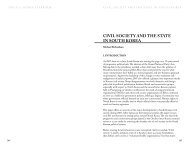YeArBooK 2007 - US-Korea Institute at SAIS
YeArBooK 2007 - US-Korea Institute at SAIS
YeArBooK 2007 - US-Korea Institute at SAIS
You also want an ePaper? Increase the reach of your titles
YUMPU automatically turns print PDFs into web optimized ePapers that Google loves.
saIs U.s.-<strong>Korea</strong> YearbooK<br />
4<br />
The <strong>SAIS</strong> U.S.-<strong>Korea</strong> Yearbook <strong>2007</strong> is divided into four parts: U.S.-ROK<br />
Rel<strong>at</strong>ions, U.S.-DPRK Rel<strong>at</strong>ions, <strong>Korea</strong> in the Region, and <strong>Korea</strong>n Politics.<br />
I. U.S.-roK rel<strong>at</strong>ions<br />
Samuel Yim, formerly a U.S. Army officer who served in <strong>Korea</strong>, reports<br />
on the transform<strong>at</strong>ion of the ROK-U.S. alliance through return of<br />
wartime OPCON of ROK soldiers and developments in the base<br />
reloc<strong>at</strong>ion plan for the U.S. forces st<strong>at</strong>ioned in South <strong>Korea</strong>.<br />
Ting Xu, a gradu<strong>at</strong>e of Beijing Normal University who worked in<br />
advertising and development in China, Japan and the U.S., writes about<br />
the future of the ROK-U.S. alliance.<br />
Andrew Anderson-Sprecher, who is currently a trade consultant in<br />
a Washington, D.C. law firm, examines the uncertain future of the<br />
KOR<strong>US</strong> FTA and its political complexities.<br />
II. U.S.-dPrK rel<strong>at</strong>ions<br />
rian Jensen, who previously worked in Washington, D.C. on various<br />
security and political reform issues in Asia, surveys the Six-Party Talks<br />
and assesses prospects for continued progress in U.S.-North <strong>Korea</strong><br />
rel<strong>at</strong>ions.<br />
Yumi Kim, a gradu<strong>at</strong>e of Princeton University who worked for several<br />
years in public service and non-profit organiz<strong>at</strong>ions, examines the<br />
uncertain legal st<strong>at</strong>us and tre<strong>at</strong>ment of displaced North <strong>Korea</strong>ns.<br />
Tania l. Askins, who worked for Salomon Smith Barney/Citigroup in<br />
New York in their infrastructure finance group, analyzes the economic<br />
conditions of North <strong>Korea</strong> and possible scenarios for change and future<br />
development.<br />
III. <strong>Korea</strong> in the region<br />
Michael Yo, who interned <strong>at</strong> the <strong>Korea</strong>n <strong>Institute</strong> of Defense Analyses,<br />
reports on the political, economic, and cultural aspects of inter-<strong>Korea</strong>n<br />
rel<strong>at</strong>ions of the past year from the nuclear test to the summit meeting.<br />
InTrodUCTIon<br />
n<strong>at</strong> Kretchun, who has experience studying language and conducting<br />
academic research in both <strong>Korea</strong> and China, examines <strong>Korea</strong>-Japan<br />
rel<strong>at</strong>ions over the past year with a particular focus on the effects<br />
of historical memory on contemporary rel<strong>at</strong>ions between the two<br />
countries.<br />
M<strong>at</strong>hias Hartpence, a gradu<strong>at</strong>e of McGill University in Canada<br />
who worked in the public and priv<strong>at</strong>e sectors in China, writes about<br />
the diplom<strong>at</strong>ic rel<strong>at</strong>ions between Beijing and Pyongyang, within the<br />
context of the reengagement process th<strong>at</strong> the Six Party Talks witnessed<br />
in <strong>2007</strong>.<br />
Benhan limketkai, who has worked in the financial sector in San<br />
Francisco, reports on North <strong>Korea</strong>-China economic rel<strong>at</strong>ions and the<br />
deterministic role th<strong>at</strong> the interaction could have on North <strong>Korea</strong>n<br />
economic reform and development.<br />
Jason Cohen, who has experience working in the financial and<br />
consulting sectors in Asia, examines South <strong>Korea</strong>-China rel<strong>at</strong>ions<br />
through political, economic, and socio-cultural dimensions.<br />
IV. <strong>Korea</strong>n Politics<br />
Thomas S. Kang, who worked <strong>at</strong> the San Diego World Trade Center<br />
and interned <strong>at</strong> the law firm Munger, Tolles & Olson LLP, reports on<br />
inter-<strong>Korea</strong>n rel<strong>at</strong>ions, North <strong>Korea</strong> policy in South <strong>Korea</strong>’s domestic<br />
politics, and the presidential elections.<br />
Michael richardson, who was a Princeton in Asia Fellow in South<br />
<strong>Korea</strong> and taught English liter<strong>at</strong>ure and composition in Seoul, writes<br />
about the influence of South <strong>Korea</strong>n civil society on inter-<strong>Korea</strong>n<br />
rel<strong>at</strong>ions.<br />
Shaw-lin Chaw, a gradu<strong>at</strong>e of the N<strong>at</strong>ional University of Singapore<br />
who used to report finance business-rel<strong>at</strong>ed news in Hong Kong, covers<br />
the consolid<strong>at</strong>ion and transform<strong>at</strong>ion of South <strong>Korea</strong>’s democracy and<br />
the trends of foreign policy under President Lee Myung-bak.<br />
The yearbook would not have been possible without generous support from<br />
many people. For their unsparing assistance th<strong>at</strong> made the class trip to<br />
Seoul possible, I am deeply gr<strong>at</strong>eful to U.S.-<strong>Korea</strong> <strong>Institute</strong> Chairman Don<br />
Oberdorfer, Deputy Chairman Yong Shik Choo, Director Jae Ku, and generous<br />
donors. Many officials and officers in Washington and Seoul helped us arrange<br />
5


